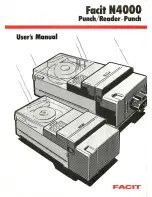
34
Copyright 2014 unitech Electronics Co., Ltd. All rights reserved. Unitech is a registered trademark of unitech Electronics Co., Ltd.
Chapter 4
Data Editing
Prefix/Suffix Overview
When a bar code is scanned, additional information is sent to the host computer along with the
bar code data. This group of bar code data and additional, user-defined data is called a
“message string.” The selections in this section are used to build the user-defined data into the
message string.
Prefix and Suffix characters are data characters that can be sent before and after scanned data.
You can specify if they should be sent with all symbologies, or only with specific symbologies.
The following illustration shows the breakdown of a message string:
Points to Keep In Mind
‧
It is not necessary to build a message string. The selections in this chapter are only used if
you wish to alter the default settings.
Default prefix = None. Default suffix = None
.
‧
A prefix or suffix may be added or cleared from one symbology or all symbologies.
‧
You can add any prefix or suffix from the ASCII Conversion Chart (Code Page 1252),
beginning on page 115, plus Code I.D. and AIM I.D.
‧
You can string together several entries for several symbologies at one time.
‧
Enter prefixes and suffixes in the order in which you want them to appear on the output.
‧
When setting up for specific symbologies (as opposed to all symbologies), the specific
symbology ID value counts as an added prefix or suffix character.
‧
The maximum size of a prefix or suffix configuration is 200 characters, which includes
header information.
To Add a Prefix or Suffix:
Step 1.
Scan the
Add Prefix
or
Add Suffix
symbol (page 36).
Step 2.
Determine the 2 digit Hex value from the Symbology Chart (included in the Symbology
















































